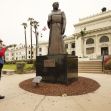Remember the iconic film shot of Marilyn Monroe standing over a street vent in a white halter dress that blew up to her panties whenever a subway went by? A tourist organization in Palm Springs, California, called PS Resorts thought the Seven Year Itch photo of Marilyn was such a great tourist attraction that it wanted to locate a huge statue of the unforgettable film moment in the middle of Museum Way, one of downtown Palm Springs’ most popular tourist streets.
Palm Springs, now the defendant and respondent in a lawsuit, endorsed a request by PS Resorts to close the street for three years so visitors could see artist Seward Johnson’s 26-foot high, 34,000-pound statue made of aluminum and stainless steel. PS Resorts, the real party in interest, is a non-profit organization that promotes tourism in Palm Springs. They argued that street closure would enhance public safety so tourists would not be a traffic hazard when they lined up to take photos of the statue called “Forever Marilyn.”
But not everyone was happy. A citizens’ group sued Palm Springs because they wanted the statue relocated and the street opened. They lost in trial court but won in the California Court of Appeal.
In a unanimous decision by a three-justice panel from Division One of California’s Fourth District Court of Appeal on February 23, the justices reversed the dismissal of the case by Riverside Superior Court Judge Ronald Johnson. Johnson had sustained Palm Beach’s demurrer without leave to amend. An opinion written by Justice Judith McConnell pointed out that Palm Beach’s street closure is not authorized by the California Vehicle Code, and Palm Springs exceeded its authority under it.
Prior to approving PS Resort’s placement of the “Marilyn Forever” statue on Museum Way and closing the street to all traffic, Palm Beach had conducted a review of the issue and presented it to the City Council, which approved the closure in 2020. The City believed it had statutory authority under the Vehicle Code to approve PS Resort’s tourist-boosting plan because the three-year closure was “temporary.” It also said the street closure was exempt from environmental review because it was only a “minor alteration of existing public structures involving negligible or no expansion of use…” Some citizens told the City Council they disagreed with the plan because they feared it would “contribute to greater traffic congestion in the downtown area.”
Section 21101(e) of the California Vehicle Code states that cities “may adopt rules and regulations on a number of matters, including “temporarily closing a portion of any street for celebrations, parades, local special events, and other purposes,” when local authorities with jurisdiction pass an approving resolution because “the closing is necessary for the safety and protection of persons who are to use that portion of the street during the temporary closing.” Justice McConnell explained that the Vehicle Code “embodies the State’s preemption over traffic control.”
The City Council approved the plan because it believed PS Resorts’ idea complied with the State Vehicle Code. Shortly thereafter, The Committee to Relocate Marilyn (the Committee) challenged the plan by filing a writ of administrative mandate that claimed the City had no authority to place the Forever Marilyn statue and close its street. It also challenged the City’s claim that it was “exempt from environmental review” under the California Environmental Quality Act (CEQA). It argued that the plan could have adverse environmental impacts on traffic, aesthetics, and historical resources.
Arguments by Palm Springs, the defendant, said that the statutory authority given by the California Vehicle Code and the Palm Springs Municipal code permitted the statue’s placement and the street closure.
But Justice McConnell disagreed. The City argued "temporary" means that something lasts for a limited time-regardless of how long that time may be. In other words, the City claimed "temporarily" is an antonym of "permanently.” After a long thesaurus-like discussion of the meaning of the terms, the Justices concluded that the law allowed for street closures only for a “relatively short period of time,” days or weeks, but not years. They also said they must "avoid a construction that would lead to unreasonable, impractical, or arbitrary results.”
The opinion further concluded that the Committee’s allegation in its CEQA cause of action was timely because the statute of limitations was not exceeded after Palm Springs decided to close Museum Way to all traffic, rather than just limiting access. It ruled that the Committee’s environmental action could go forward because it was “not time-barred.”
The trial court will now have to vacate its order that sustained the City’s demurrer without leave to amend and enter a new order regarding the timeliness of the environmental issues. It also gave the Committee its costs.
The City could now have to find another location for the 26-foot-high Marilyn to show her undies.






